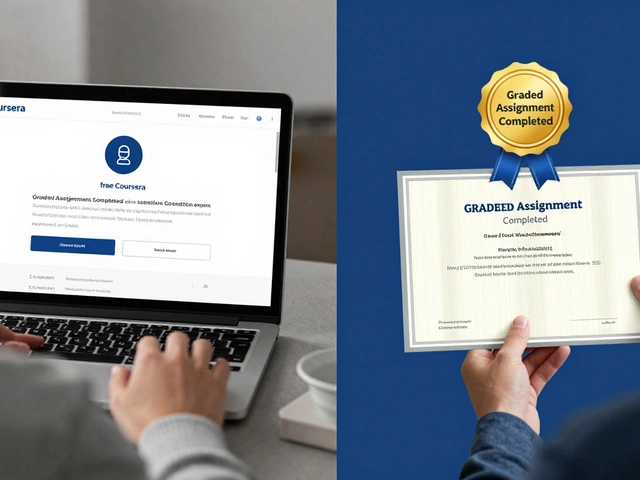If you've been scrolling through job listings, you've probably seen at least a few that mention Google Certificates. People love to argue about whether these certificates can actually help you land a job, or if they’re just another line on your resume. The truth? It’s not black and white. Companies are shifting the way they look at credentials, and Google’s courses are smack in the middle of that shift.
The main thing to know is that thousands of people—new grads, career changers, folks who never went to college—are enrolling in Google certificate programs like IT Support, Data Analytics, Project Management, and UX Design. They’re not just looking for another badge; they want a real shot at a better job. If you’re weighing your options, it’s smart to understand how these certificates stack up in the job market, and what you can do to make yours stand out from the crowd. Let’s break down what you actually get from these certificates and how they’re viewed by employers in 2025.
- What Are Google Certificates and Who Takes Them?
- Do Employers Actually Care About Google Certificates?
- Real Results: Success Stories and Hard Data
- How to Make Your Google Certificate Work for You
- Beyond the Certificate: Skills, Networking, and Job Search Tips
What Are Google Certificates and Who Takes Them?
Google Certificates are short, focused online programs built to get people job-ready fast, without the need for a college degree. These aren’t just generic courses. Google worked with actual employers and industry pros to design programs that cover skills companies need right now. The most popular tracks are IT Support, Data Analytics, Project Management, and UX Design. Each program usually takes three to six months to finish if you go part-time, so you don’t have to pause your life or work to squeeze them in.
Think of them as a mix of video lessons, interactive quizzes, and real-world projects. You learn things you’ll use on the job—like how to troubleshoot a network problem or build a dashboard in Google Data Studio. When you pass, you get a digital certificate you can stick on your LinkedIn and even share with potential employers right away—the Google certificate is designed to be recognized by hiring teams, not just education fans.
So, who’s signing up for these programs? It’s actually a pretty wide mix:
- People switching careers—think folks going from retail gigs to tech roles.
- Recent high school grads who don’t want massive student debt.
- Working pros looking to upgrade skills without campus classes.
- Parents or older adults re-entering the job market.
Google claims that more than 250,000 people finish a certificate program every year in the U.S. alone. Coursera, one of the main platforms for Google’s courses, says about 58% of learners are between 25 and 44 years old, and almost 40% are women—higher than the tech industry average.
| Certificate Track | Typical Duration | Cost (USD) | Most Common Student |
|---|---|---|---|
| IT Support | ~6 months | $49/month | Career changers, entry-level |
| Data Analytics | ~6 months | $49/month | Mid-career, college alternatives |
| Project Management | ~6 months | $49/month | Working adults, skill upgraders |
| UX Design | ~6 months | $49/month | Creatives, recent grads |
The bottom line? If you need job-ready skills without spending years (or a fortune) in school, these certificates are built for you. And with zero experience required to start, lots of people see them as a real gateway into higher-paying jobs.
Do Employers Actually Care About Google Certificates?
Okay, time for the big question: do companies really care about a Google certificate when you’re looking for a job? Turns out, the answer depends on who you ask, but there’s plenty of evidence that employers are starting to pay attention. Google didn’t create their certificate programs just for fun—they worked directly with companies like Accenture, Walmart, and Infosys to set up real hiring pipelines. That means if you finish a certificate, you can actually apply to these partners through a dedicated job portal. LinkedIn data from 2024 shows an uptick in job postings for entry-level tech roles that include “Google Career Certificate preferred” in the requirements. Companies especially value these certificates in fields like data analytics, IT support, and project management.
A bunch of small and midsize businesses also look to these certificates because they know not everyone has the time or money for a full college degree. In fact, in a Google blog post, a senior recruiter from Deloitte said,
“The Google Career Certificates make candidates stand out for our entry-level tech jobs. We know the curriculum has them practice real skills, not just pass tests.”
If you’re hoping to work for a big Silicon Valley name or climb high in finance, a Google certificate alone might not cut it. But recruiters do see these certificates as proof that you’ve got the current skills and the motivation to learn—a big plus in today’s market. For entry-level jobs, many employers will look at your projects and your problem-solving skills, and a Google certificate program requires both.
- Employers like seeing Google certificates alongside real project work—show both on your resume.
- Career changers stand out quickly, since certificates are focused and updated for actual job demands.
- Don’t hide your certificate at the bottom of your resume; call it out near the top, especially if you’re new to the field.
So no, it’s not magic, but these certificates do help open doors. It pays to know which companies really value them and to be ready to show how you used what you learned in real-world ways.

Real Results: Success Stories and Hard Data
If you want to know if Google certificates really pay off, the numbers do some heavy lifting. Back in 2023, Google published survey results showing that more than 75% of people who completed a Google Career Certificate said it had a positive impact on their career within six months—whether that meant landing a new job, getting a promotion, or just drawing a bigger paycheck. That’s a pretty strong signal for anyone thinking about jumping in.
There’s no shortage of success stories floating around on LinkedIn. You’ll see folks who went from retail or food service jobs to entry-level IT roles after finishing the Google IT Support certificate. One guy from Florida, a former barista, landed an IT job at a regional healthcare provider in less than 90 days post-completion. A single mom in Ohio switched careers into data analytics without going back to college, armed only with her Google certificate and a handful of portfolio projects she built along the way.
Let’s be clear, though—it isn’t a magic ticket. The real trick is combining the certificate with hands-on practice, networking, and tailoring your resume to highlight your new skills. Those who hustle a bit beyond the online coursework tend to get the quickest results.
Want the cold, hard data? Here’s a snapshot of what Google has reported about outcomes, which mirrors what some enrolling partners like Coursera have also seen:
| Outcome Type | Percentage (Google, 2023) |
|---|---|
| Positive career impact within 6 months | 75% |
| New job/role after certificate | 58% |
| Promotion after certificate | 18% |
| Increased pay after certificate | 24% |
Take that "New job/role" number—it means that well over half of the program grads saw some real movement. When compared to the average job placement rates for folks with either no degree or some college, those numbers hold up pretty well.
If you're worried about companies not taking the certificate seriously, you might like this: Over 150 employers are part of the Google Career Certificates employer consortium—big names like Walmart, Infosys, and Verizon are on the list. They all say they recognize these certificates as proof of real-world skills.
The most important thing? Your Google certificate is worth as much as the effort you put in after you get it. The certificate opens doors, but you still have to walk through them—by building a portfolio, applying to relevant jobs, and following up with real humans, not just submitting online forms.
How to Make Your Google Certificate Work for You
Finishing a Google certificate is just your first step. Tons of people have done the courses, so if you want yours to actually help you get hired, you have to show how it makes you ready for real work—not just exams.
First things first: Don’t just tuck that badge onto your LinkedIn and hope. Hiring managers see hundreds of Google certificate holders. Make yourself stand out by linking your learning to something you’ve actually built or done. For example, if you finished the Google Data Analytics course, run a real analysis on a public dataset, post your findings, and add that project to your online portfolio.
Here are some steps to get the most value out of your Google certificate:
- Show Off Real Projects: Use your course projects or build new ones. Link them on your resume and your LinkedIn profile. Google Career Certificates give you practical assignments—don’t let them sit unseen.
- Network Smart: Google partners with companies like Walmart and Infosys for its job boards. Join the Google Career Certificates employer network, and tap into their job platform. Message people already working in those companies through LinkedIn. Mention your certificate and your completed projects.
- Use the Job Support Features: Each Google program has job resources—resume templates, mock interview tips, and even direct job listings. Don’t ignore those; they’re made for fast-tracking your search.
- Highlight Skills, Not Just the Certificate: Employers are hunting for skills like SQL, Python, or Agile project management. In your application, list those skills and say exactly where you used them (class projects, personal side gigs, volunteer work).
- Keep Learning: Certificates can get you interviews, but most hiring managers want proof you’re still learning. Follow up with another quick course or even YouTube tutorials and mention this in interviews. It shows hustle.
Worried the certificate won’t stack up against a college degree? Check out what a Google-commissioned study (happened in 2024) found. Over 82% of certificate completers reported a positive career outcome, like a new job, promotion, or raise, within six months. That’s fast compared to the average college grad who takes about eight months to land a job in their field after graduation.
| Outcome | Percentage |
|---|---|
| Found a new job | 45% |
| Got a promotion | 28% |
| Raised salary | 9% |
| No career change yet | 18% |
If you really want to move the needle, combine the certificate with other small wins: freelance gigs, internships (even unpaid or virtual), or contributing to open source. You don’t need a fancy past—just proof you turned this learning into action.

Beyond the Certificate: Skills, Networking, and Job Search Tips
So you’ve finished your Google certificate. Don't just sit and hope something happens—now’s the time to turn that certificate into actual job offers. Just showing a badge isn’t enough for most employers. Companies want to see that you not only learned something but that you can do something with those new skills.
One smart move: keep building. If you started with IT Support, try tackling the CompTIA A+ or another related certificate. The same goes for other areas—if you can stack a Google certificate with hands-on experience or even a small portfolio, you’ll jump ahead of the crowd.
Networking is huge in landing jobs, even for tech fields. LinkedIn is a must—don’t just add recruiters, join groups for your field and actually take part in conversations. Before and after finishing the program, connect with classmates and instructors. A referral can put your resume right at the top of the pile. Funny fact: according to LinkedIn, 85% of jobs get filled through some kind of networking.
Here’s a killer data point for 2025 job hunters: A Coursera survey found that 72% of learners who completed a professional certificate (including Google’s) reported career benefits—like a new job, promotion, or raise—within six months. That’s not just luck: it’s because they went way beyond just the coursework.
| Action | Impact (Reported by Job Seekers) |
|---|---|
| Built a portfolio/project | 65% landed interviews |
| Networked on LinkedIn or events | 60% reported more recruiter contacts |
| Practiced job interview skills | 48% felt more confident in interviews |
Here's how to make your Google certificate really count:
- Show your skills: Build a small project or contribute to open source—even for just a few weeks. Put it on your resume and talk it up in interviews.
- Don’t skip networking: Message people who have the jobs you want. Ask them for a 10-minute phone chat—most folks actually say yes.
- Target your job search: Search for companies that specifically mention Google certificates or welcome alternative credentials. Google has a hiring consortium with over 150 companies actively looking at their certificate grads.
In the end, certificates open doors but you still need to walk through. Stack your skills, keep meeting people, and keep applying. Persistence beats luck, every time.




